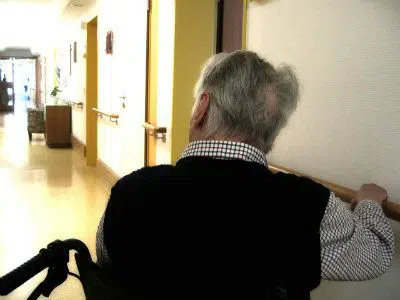

Many Americans balk at the idea of sending their elderly loved ones to a nursing home. There is a stigma attached to residential facilities. Nursing care is often sporadic and the quality of many homes leaves a lot to be desired. For those with parents who have a disability the fear of nursing homes is even more distressing. Therefore, many people with disabled parents choose to invest their own time and money into caring for them. However, this can be a costly endeavor.
The number of disabled seniors choosing to stay in their homes as they age has steadily increased over the last couple of generations. This requires the help of caregivers who can help them with daily tasks. From 1998 to 2012, the number of disabled seniors utilizing in-home help increased by 3.1 million; about 50% of seniors had some kind of in-home health care in 2012. Much of this care came from family members, either children or spouses.
Many of the caregivers for seniors are family members or friends, and this kind of responsibility does take its toll. Research has indicated that 40% of caregivers spend at least twenty hours a week caring for their elder family member, the equivalent of a part-time job. On top of their full-time job and taking care of their own children, the extra responsibility can lead to depression and exhaustion. Fortunately, the government is beginning to recognize the importance of offering caregiver respites and will often pay for a portion of it.
Caring for the aging senior in a home setting involves careful planning and a lot of time. Some of the tasks caregivers might be responsible for include:
In cases where the senior has a more debilitating illness, it may become necessary to help him/her eat or change medical dressings or monitor blood sugar.
While the physical and psychological effects of caring for an aging relative can be significant, they are accompanied by a significant financial effect as well. It is estimated that over their lifetime, a primary caregiver will lose approximately $303,000 in money and benefits. This includes money spent on deductibles, medical visits not covered by Medicare or Medicaid, and the simple products of living. From hygiene products to simple household necessities, it all adds up.
An informal caregiver is, by its name, one who is not paid to care for their senior relative. But the government has recognized the need for some kind of assistance for caregivers. In 2001 the government established the National Family Caregiver Support Program(NFCSP). This program provides the states with grants to support caregivers who are responsible for relatives or friends. With this program, caregivers can find support in the form of therapy, training programs, access to support groups, respite care and supplemental services as needed.

Most caregivers need respite services the most, just a break from the constant responsibility. In the fiscal year 2010, NFCSP provided more than 64,000 caregivers with approximately 6.8million hours of temporary relief from their duties. It is programs like this that make it possible for seniors to continue to receive care in their own homes and with their own families.
Government programs such as Medicare and Medicaid continue to invest in the future of in-home care over institutional services. Over the last thirty years, access to in-home care has increased due to increased funding for such services. The Affordable Care Act of 2010 expanded the Medicaid program significantly and offers incentives to states that will provide community-based and in-home care for seniors over institutional care. As a result, more disabled seniors are getting access to quality care at home through Medicaid and are living a better quality of life.

Haberman Law is dedicated to representing the rights of victims of nursing home abuse and neglect.
Many of us turn to nursing homes, assisted living facilities, and group homes to provide care for our elderly loved ones.
If you suspect that a loved one was the victim of abuse or neglect in a nursing home, assisted living facility, or group home, contact us.
Call us for a free consultation:
215-240-7771
© 2025 PA Nursing Home Lawyers By Len Haberman, Esq. All Rights Reserved